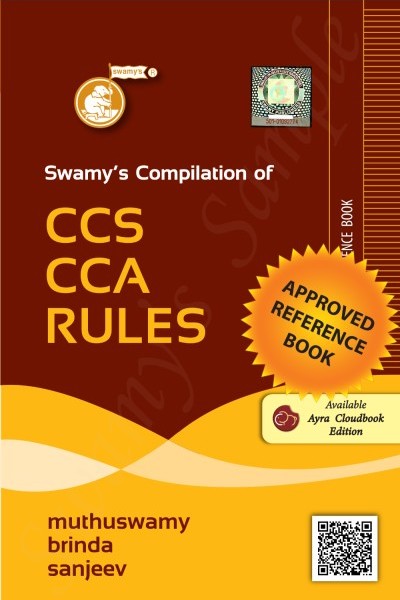
Table of Contents
Central Civil Services (CCS) Leave Rules in India: A Comprehensive Guide
The Central Civil Services (CCS) Leave Rules in India govern leave entitlements and conditions for government employees. These rules, outlined in the Central Civil Services (Leave) Rules, 1972, ensure a balance between professional obligations and personal needs for employees in various ministries and departments. Here’s a detailed overview of the CCS Leave Rules, their types, and their implications.
Types of Leave Under CCS Leave Rules
1. Earned Leave (EL)
Earned Leave is meant for personal rest or recreation.
- Eligibility: Employees earn leave based on their service period, generally 15 days per six months.
- Accumulation: Employees can accumulate up to 300 days.
- Encashment: Encashment is allowed during service and at retirement.
2. Half Pay Leave (HPL)
This leave is granted for medical purposes or private affairs.
- Eligibility: Employees earn 20 days per year of service.
- Pay: During HPL, employees receive half of their basic pay.
3. Commuted Leave
This leave allows employees to convert HPL into full-pay leave.
- Usage: Typically used for medical reasons.
- Condition: Limited to twice the amount of HPL available.
4. Casual Leave (CL)
Casual Leave is for short, unforeseen personal reasons.
- Duration: Generally, 8–12 days annually, depending on the organization.
- Features: Cannot be combined with other types of leave or carried forward.
5. Leave on Medical Certificate
- Purpose: Granted for treatment of illness or recuperation.
- Requirement: A certified medical certificate is mandatory.
6. Maternity Leave
Maternity Leave is a crucial entitlement for female employees.
- Duration: 180 days for the first two children.
- Additional Leave: 45 days for complications arising from delivery.
- Adoption Leave: 60 days for adopting a child below one year of age.
7. Paternity Leave
Male employees are entitled to Paternity Leave.
- Duration: 15 days during or within six months of childbirth.
8. Child Care Leave (CCL)
CCL is granted to female employees for child-related needs.
- Duration: Up to 730 days for two children.
- Features: Paid leave at 100% salary for the first 365 days and 80% for the next.
9. Study Leave
Study Leave is for higher education or skill enhancement.
- Eligibility: Must have completed at least five years of service.
- Duration: Up to 24 months.
10. Extraordinary Leave (EOL)
EOL is granted when no other leave is applicable.
- Condition: Unpaid leave requiring prior approval.

CCS Special Leave Categories
1. Leave for Special Purposes
- Hospital Leave: For injuries incurred during service.
- Child Adoption Leave: For adoptive mothers.
- Quarantine Leave: For infectious diseases.
2. Leave Not Due (LND)
- Purpose: Granted to employees without adequate leave balance.
- Condition: Deducted from future earned leave.
3. Leave for Family Planning
Special leave is available for undergoing family planning procedures.
- Eligibility: Applies to both male and female employees.
- Duration: Varies depending on the procedure.
Key Rules and Guidelines
1. Leave Application and Sanction
- Leave must be applied in advance, except for emergencies.
- Approving authority has the discretion to grant or deny leave based on organizational needs.
2. Combining Leave
- Employees can combine different types of leave, such as Earned Leave and Half Pay Leave, with prior approval.
- Casual Leave cannot be combined with other types of leave.
3. Leave During Notice Period
- Leave during the notice period is discouraged unless approved for emergencies or medical reasons.
4. Leave for Temporary Employees
Temporary government employees are also eligible for certain types of leave, like Earned Leave and Casual Leave, on a pro-rata basis.
Encashment and Accumulation of Leave
- Leave Encashment: Employees can encash up to 10 days of Earned Leave annually during service, subject to conditions.
- Leave at Retirement: Encashment of up to 300 days of Earned Leave is permissible.
Challenges in Leave Management
Despite clear guidelines, employees often face challenges:
- Delays in approval due to bureaucratic procedures.
- Misunderstandings about eligibility and rules.
- Lack of awareness regarding leave entitlements.
To address these issues, organizations must ensure regular training and clear communication regarding CCS Leave Rules.
Conclusion
The CCS Leave Rules are a cornerstone of employee welfare in the Indian government, offering diverse leave options to balance professional and personal commitments. By understanding these rules, employees can make informed decisions about their leave and maintain a healthier work-life balance.
Frequently Asked Questions (FAQs)
- Can leave be denied by the authority?
Yes, leave can be denied based on organizational requirements, except for mandatory leaves like maternity leave. - Is unused Casual Leave carried forward?
No, Casual Leave cannot be carried forward. - Can Commuted Leave be availed for non-medical purposes?
No, it is primarily for medical reasons. - What happens if an employee exhausts all leave balances?
Extraordinary Leave (EOL) can be availed without pay, subject to approval. - Is Study Leave considered as service period?
Yes, Study Leave is counted as part of the service period.
